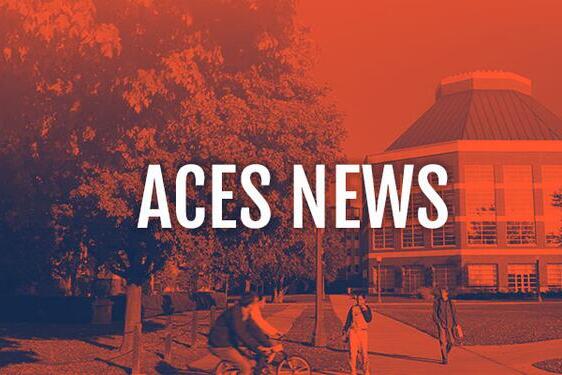ACES international ‘seed grants’ grow into significant impacts around the world

A longstanding internal grant program coordinated by the Office of International Programs (OIP) in the College of Agricultural, Consumer and Environmental Sciences (ACES) is realizing its goal of facilitating international efforts and collaborations that ultimately benefit ACES while making impacts around the world.
The international seed grants program was initiated in 2009. Each project is funded through the Arlys Conrad Endowment Fund.
Over the past nine years, 18 rounds of recipients have received up to $4,000 for their proposed projects to build an international dimension into their existing work.
“Sometimes faculty just need a source of funds to get a project started, for example to collect data, and then they can use the data to go after a larger proposal. Time and time again these initial funds have led to additional funding in the future,” said Alex Winter-Nelson, director of the ACES Office of International Programs.
“We recently started tracking the impacts of this program and the results have been encouraging. We knew the seed grants promoted collaborations between ACES faculty and international partners but we were unaware of the magnitude of impacts supported by these grants,” said Winter-Nelson.
Laura Christianson, assistant professor of water quality in the Department of Crop Sciences, who received a seed grant in spring 2016, volunteered her testimonial for this funding.
“The funding led to many positive outcomes that it was intended to spur -- collaborative publications and presentations, additional networking, broader student training opportunities. Perhaps more importantly, it strengthened and created new relationships, which of course, form the heart of any collaboration. The original seed-funded experience and resulting follow-up interactions and travel were significant learning opportunities for me, and I had fun, to boot,” said Christianson.
OIP generally requests feedback from the recipients two years after the grant was provided to ensure enough time has passed for impacts to materialize.
“The latest round of reporting we did for the Spring 2016 seed grants was especially impressive,” noted Winter-Nelson.
Impacts reported from the Spring 2016 seed grants:
- With the help of seed grant funds to collect preliminary data with the Institute of Cytology and Genetics in Russia, Anna Kukekova, assistant professor in animal sciences, was awarded a large grant from the National Institute of Health, “Molecular Mechanisms of Social Behavior.”
- Using funding from a seed grant, Pete Goldsmith, professor in agricultural and consumer economics, developed the “Field Guide to African Soybean Diseases and Pests” in collaboration with the International Institute of Tropical Agriculture. Almost all the images from this guide are based on pictures taken in Africa, including red leaf blotch and Myrothecium leaf spot, which are not common to soybeans produced in the U.S. In the first few months since its publication, the guide received hundreds of page views and Twitter impressions, in addition to the print copies distributed at the Pan-African Soybean Variety Trial program occurring in nine locations in Malawi with both public and private-sector partners and funded by the USAID Malawi program Agricultural Diversification Activity (AgDiv). The guide has also been circulated to numerous plant breeding and agronomy partners throughout the developing world. The Soybean Innovation Lab, based at Illinois, has successfully made an argument for more funding for soybean disease thanks to this new guide.
- Using funds from a seed grant, Maria Cattai de Godoy, assistant professor in animal sciences has built an international research program between the Federal University of Lavras in Brazil and the Illinois Companion Animal Nutrition (I-CAN) program to use insect meals as sustainable protein sources in canine and feline nutrition. This is a novel area of research because alternative and sustainable protein sources that are nutritional adequate and safe for pets are needed to decrease the competition of ingredient supply with the human food chain.
- Using seed grant funding, Rabin Bhattarai, assistant professor in agricultural and biological engineering, helped a Haitian partner agency implement a drip irrigation system for growing red peppers. The yields from the drip irrigated fields were two times higher than the control (rain-fed) fields. This new collaboration will continue to improve the livelihood of Haitian farmers.
These are just some of the impacts from one round of seed grants (spring 2016). These awardees and many others have shown additional impacts and have additional activities and possible funding sources pending.
OIP will announce its next round of seed grants early in the Fall 2018 semester.
Click here for more information and a list of past recipients.